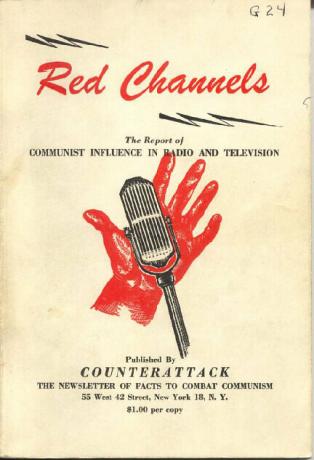Red Channels: The Report of Communist Influence in Radio and Television
When Donald Trump told his followers in April that “CBS should lose its license, and the cheaters at 60 Minutes should all be thrown out, and this disreputable ‘NEWS’ show should be immediately terminated,” it wasn’t the first time conservatives have gone on the offensive against CBS. J. Edgar Hoover had a similar outburst in 1950.
When one of his special agents suggested that CBS had been “exceptionally cordial” in its dealings with the FBI, director J. Edgar Hoover erupted. “Either our NY office is naive of the situation or just plain gullible,” he fumed. “Just recently, CBS put out a television program which was vicious in its presentations of FBI. Also, CBS still has [Charles] Collingwood as its White House correspondent and he still angles his broadcasts. Warn NY [FBI field office] not to let its guard down just because of the ‘taffy’ CBS is handing out.”
The FBI’s extensive Cold War surveillance of CBS documents a history of bullying and intimidation of media critics that continues to inform rightwing efforts to suppress dissent. While Cold War retaliation against CBS can’t provide solutions to Trump’s ongoing attacks on critics, understanding the right’s playbook may help us develop strategies for resisting in the presen
In 1950, CBS was entering what has been described as the Golden Age of television. Anthology series like the award-winning Studio One adapted literary works and commissioned original scripts by talented writers for TV. Sitcoms like Gertrude Berg’s successful The Goldbergs were making the transition to television, introducing a new generation of viewers to the ethnic diversity of New York City.
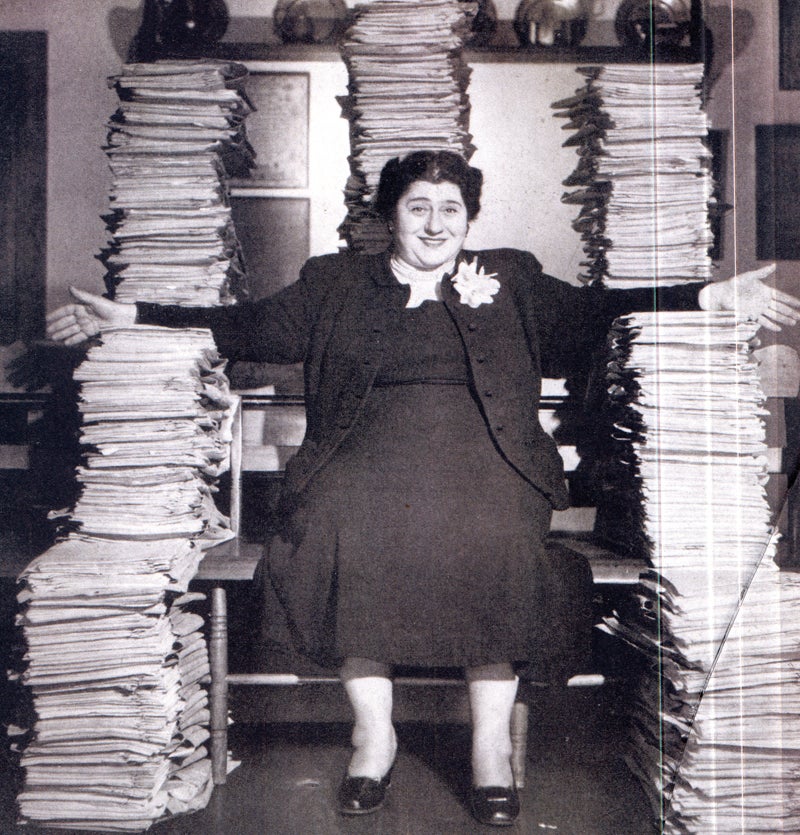
CBS’ experienced news commentators wrote their own expert and in-depth analyses of racism in the US, economic policy, the Marshall Plan, the CIA-backed civil war in Greece, and the dangers of an emerging Cold War arms race. Having defeated fascism in Europe, writers, directors, and performers at CBS and elsewhere hoped that television could enhance democracy by helping to defeat white supremacy at home.
Few of CBS’s more than 2,500 employees in New York City were aware that in addition to garnering the approval of critics, the network had attracted less positive attention from a powerful rightwing movement that included the Catholic Church, the Federal Bureau of Investigation, industrialists with economic interests in China, veterans’ organizations, legislative bodies like the House Un-American Activities Committee, and politicians like Joseph McCarthy and Richard Nixon. Intent on dismantling Roosevelt’s New Deal social programs, they accused their critics of being Communists or dupes of the Communist Party who had been “hoodwinked” into endorsing treasonous ideas like national health care, peace, affordable housing, civil rights, consumer rights, and the redistribution of wealth. Members of this movement referred to CBS as “the Communist Broadcasting System.”
Chief among CBS’ enemies was the FBI who, using the pretext of combating Communist infiltration of broadcasting, had itself infiltrated networks, advertising agencies, trade unions, and progressive organizations. Bureau informants worked throughout CBS, from the C-suite to human resources to writers’ rooms, offering testimonies about subversive behavior based on rumor and innuendo. One informant claimed that CBS was “communist-controlled, from network head William S. Paley to the secretarial pool.” Another “felt CBS was infiltrated by the Communists”; this informant provided “the names of a number of individuals employed by CBS whom he considered to be either Communists or Communist sympathizers.” According to a third, “CBS has given more leeway to progressive voices in American radio than any other network.” “Progressive,” this informant added, meant “anyone or anything” that is “in accord with the Communist line of the moment.”
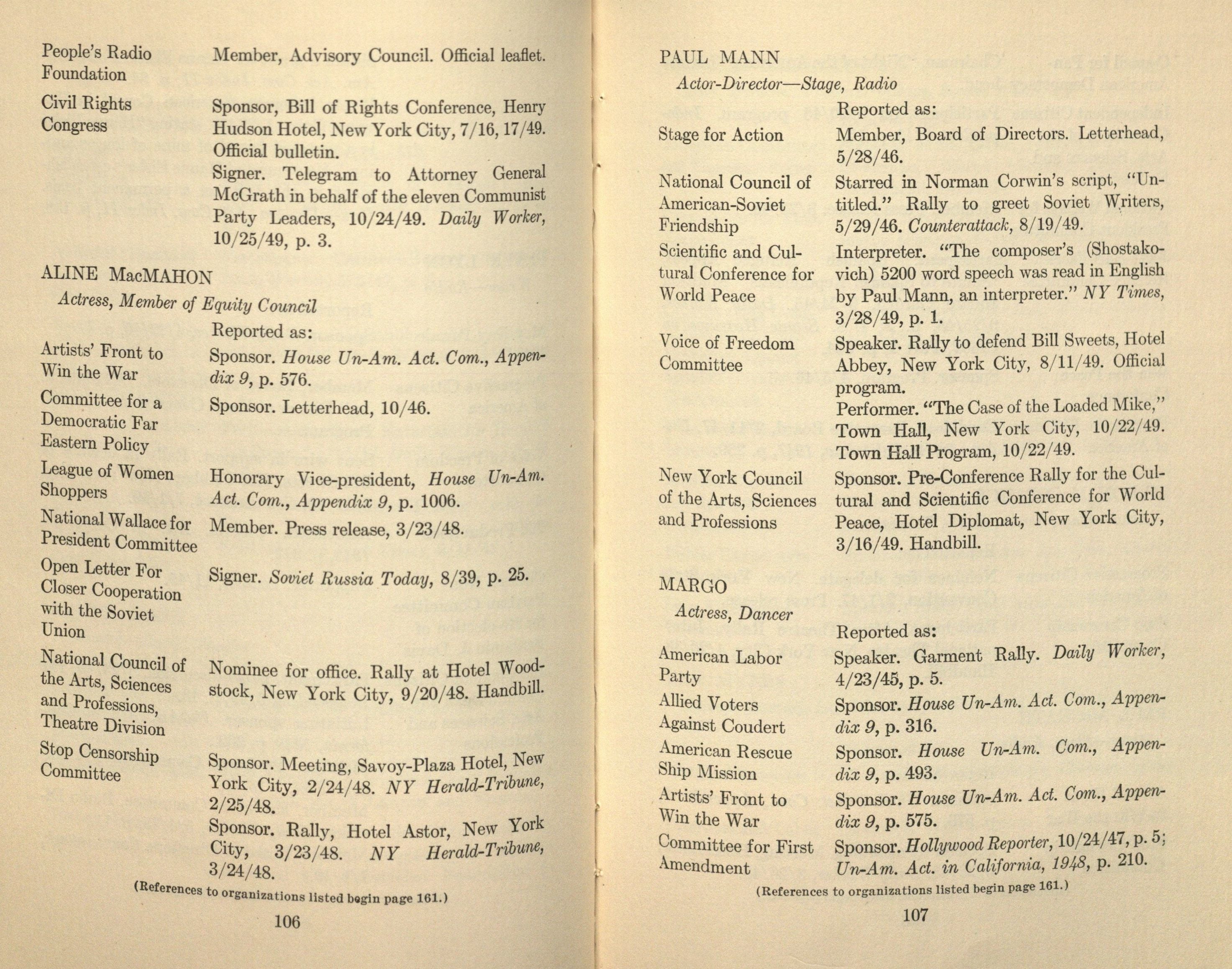
In the eyes of the right, the “Communist line of the moment” was strategically flexible. It lumped in members of the Communist Party, alongside staunch New Dealers, and centrist liberals. Issues considered indicators of communist contamination included desegregating broadcasting, supporting anti-lynching legislation, and ending police violence and the death penalty. FBI director J. Edgar Hoover, like Donald Trump, was particularly outraged by programs depicting American-style bigotry; the FBI had a long memory when it came this form of what they considered subversive behavior. Mitchell Grayson—who in 1950 was working for CBS’s documentary unit—had been lauded for directing episodes of “New World a-Comin,” a 1940s radio program that dramatized issues facing African Americans. Director and writer Bill Robson won a Peabody Award in 1943 for his “Open Letter on Race Hatred,” which explored the causes of racial unrest in Detroit, Michigan. The FBI considered both men to be communist controlled. Novelist and civil rights activist Shirley Graham—also a target of red-hunters—w wrote a 1948 CBS teleplay about poet Phillis Wheatley (the right regarded efforts to teach Black history as communist plots). FBI reports further noted that CBS and other networks were considering hiring people like Graham, W.E.B. Du Bois, Ada May Jackson, Canada Lee, and Paul Robeson to diversify their documentary and news units.
Pressured by organizations like the American Business Consultants, publishers of the blacklisting newspaper, CounterAttack: Facts to Combat Communism, in 1949, CBS fired some of those who had been identified as Communists or fellow travelers, perhaps hoping that sacrificing a handful of the more outspoken union leaders would appease the right.
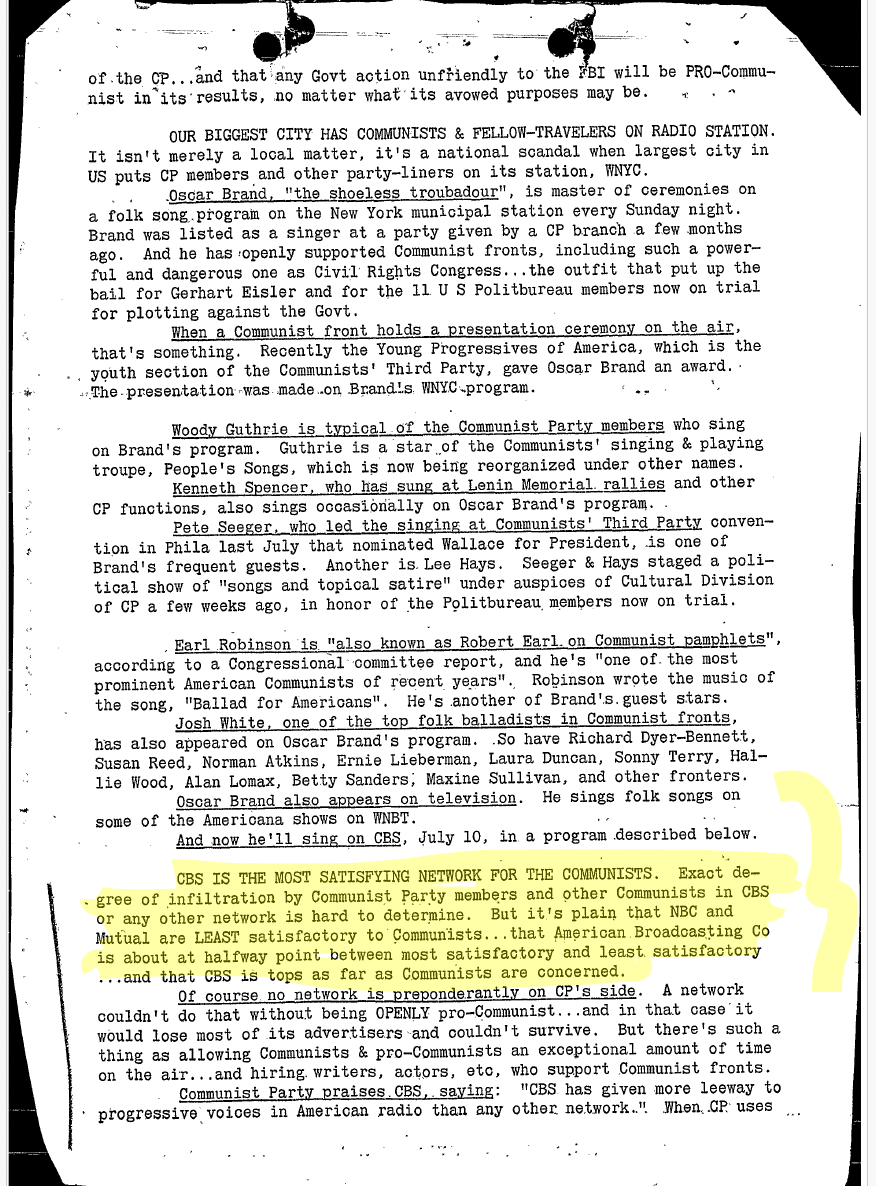
It didn’t. Days before the US openly entered the conflict in Korea in June 1950, three former FBI agents published “the bible of the blacklist,” Red Channels: The Report of Communist Influence in Radio and Television, listing 151 people anti-communists claimed were following the “Communist line of the moment.” More CBS personnel were listed in Red Channels than any other network.
Pressured by the authors of Red Channels, CBS fired actress Jean Muir because she was “‘a controversial personality’ whose presence on the show might adversely affect the sale of the advertiser’s product” and “provoke unfavorable criticism and even antagonism among sizable groups of consumers.” Privately, the FBI noted that Muir had "been active in fighting racial discrimination.”
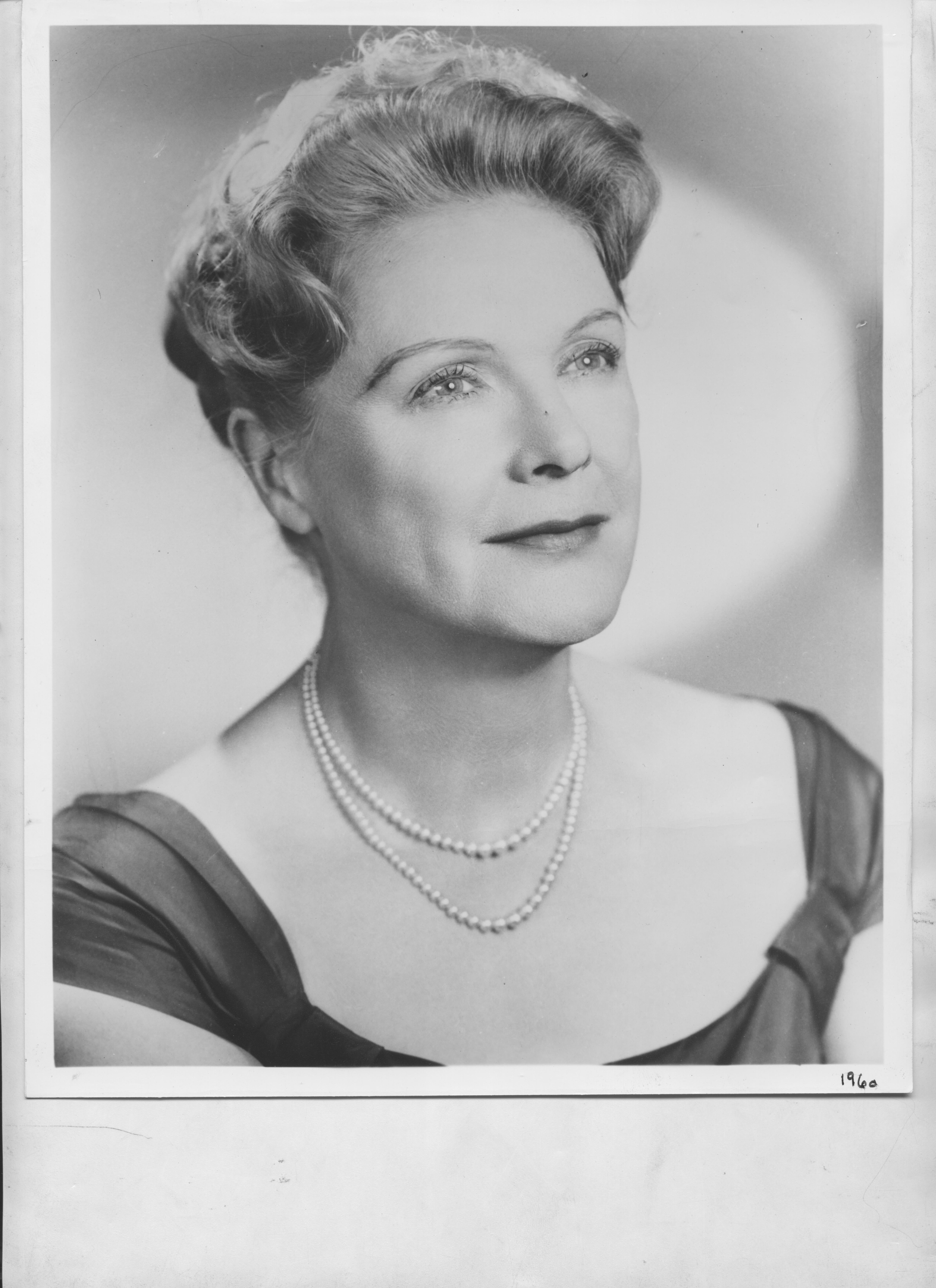
Firing Muir publicly confirmed what one CBS executive privately told the FBI: CBS was going to "clean out any people that would not be the right type of people there.” And clean it did. In response to the efforts of what musician and civil rights activist Hazel Scott described as “smear artists with the spray guns,” by December 1950, CBS had fired the leadership of its documentary unit, as well as additional personnel identified as subversive by the FBI and its movement allies. CBS also established a department to administer internal security (headed by a former FBI agent), adopting the strictest loyalty oath program in the industry (employees had to affirm that they were not, nor ever had been, a member of any organization that had been identified as subversive by the US attorney general). These concessions to the Right sent a powerful message to the industry, silencing a generation of radical actors, writers, directors, producers, and filmmakers.
In 1947, blacklisted writer Lillian Hellman warned that conservatives picked frightened men to frighten first. “Judas goats,” she called them, predicting that they would lead “All of us who believe in this lovely land and its freedoms and rights, and who wish to keep it good and make it better” to the slaughter. Today, we have taken too many steps down that repressive road: censoring opinions, forcing resignations of those deemed politically impure, conceding to a lawsuit one legal expert described as “laughable and . . . an affront to the First Amendment.” The attack on CBS in 1950 should remind us that nothing short of surrender will appease those willing to use the power of government to silence critics.
